Floating

Ichiyûsai Kuniyoshi: famous heroes of the kabuki stage--played by frogs (circa 1850-1860)
" … dreaming to make that dream come true …"
The upstairs hall ceiling had troubled our painter Curt from the beginning of his work. He wisely set aside his concerns through the first two weeks of preparation work. By then, he'd painstakingly sanded out and primed the bannister and knocked the high points off the walls, pulled baseboards in the entry hall and fixed every ding between the front door and the stair top. Then, our series of muted conversations about the ceiling came to something. He confessed that he could see no way around Floating the damned thing, a comment of which I didn't quite know its meaning, but I nodded gravely, as if discussing a sick child. Curt listed the alternatives, each of which seemed filled with shortcomings, but he wanted this to be my decision. HomeMakers sometimes find themselves in this position, as if a wise parent or something, called to decide about something they have no clue about. I asked him to describe what Floating might entail.
It would, as Curt described, require three sets of probably two hour stretches, poised atop his four footer, smearing goop over the present ceiling covering.
Cleanering

Jan Neumann: Monument to the Janitor (St Petersburg, 2007)
"Nobody later will notice."
Curt our painter and I try to run a tidy operation. We attempt to clean up the unavoidable messes renovating quite naturally produces. We keep a broom and a vacuum handy, even though we both know that we're fighting an inevitably losing battle. How ever much sanding dust we might manage to capture, at least that much remains even after we've finished cleaning. I've taken to dust mopping the walls after Curt spends a day sanding off the high points of an unfortunate gritty top coat some prior owner smeared over some of the plaster walls, leaving unsightly swirls. We're trying to render those walls minimally presentable, understanding that nothing short of replacing them with drywall could ever render them perfectly plumb again and The Muse and I want the age of this place to show through the new paint. We're not erasing history, just taming it a bit. Taming history's messy business with some new form of detritus appearing daily. Each presents a challenge we cannot completely mitigate, but we attempt to keep up with cleaning up lest we accidentally overwhelm ourselves.
Such Cleanering belongs to that special class of apparently meaningless work, effort that will either make no apparent difference or be shortly erased, but which absolutely must be accomplished.
ColdFooting
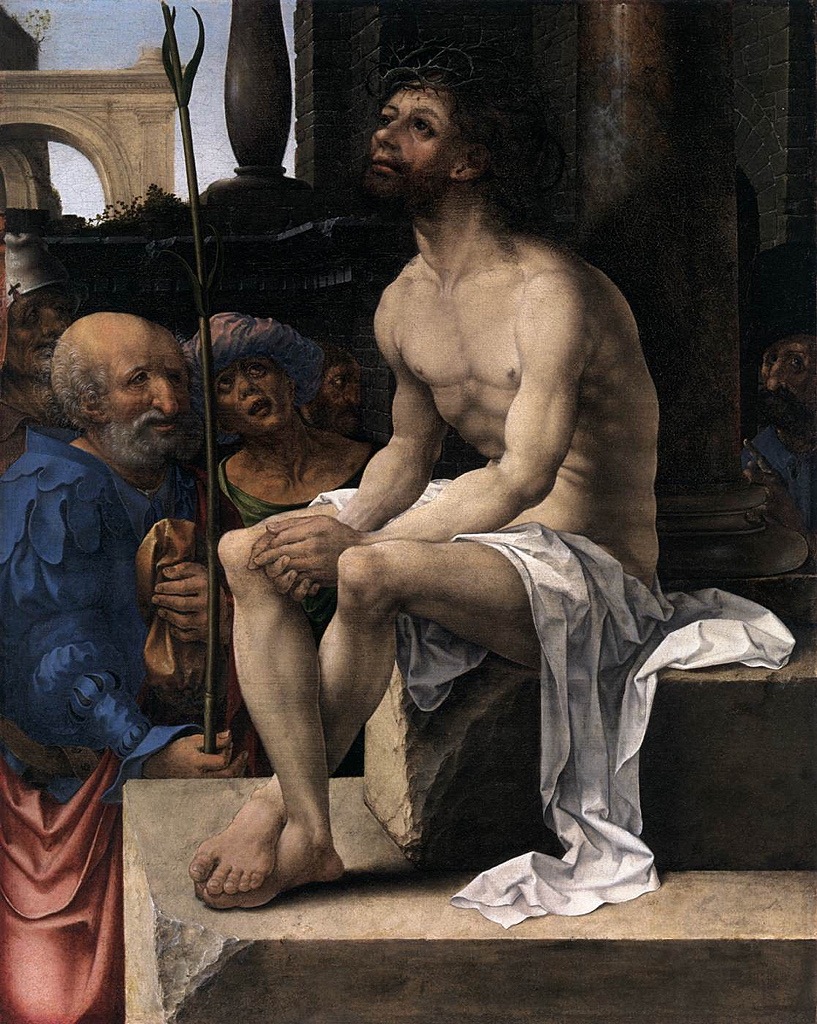
Jan Gossart: Christ on the Cold Stone (1527)
"I'll be contributing by ColdFooting every damned inch of the way."
It all seemed like a great idea at first, last March, before we'd attempted to move back into The Villa Vatta Schmaltz after a twelve year absence. We mustered an I Know, We Could Put On A Show!-quality bright idea and set our expectations on refinishing 3/4 of the floors and repainting even more of the walls. We tried to be prudent with our move-in, leaving many boxes packed and many in areas not slated for renovation, but still, we unpacked plenty that will need relocating as our renovating proceeds at a pace considerably faster than the average snail's, but of course more slowly than we'd earlier imagined. What might have been slight inconvenience appears likely to become our lifestyle until we're in the shadow of Christmas. I'm guardedly confident that I might finally unpack my books by the new year, which will almost mark a year since I started boxing them up for that big, final move. The year's been spent somewhere between there and here.
The floor contractor came yesterday to survey the upcoming job. He entered a foyer partially prepared for painting to the smell of prime coat finally spreading on the long-sanded bannister.
Doorable
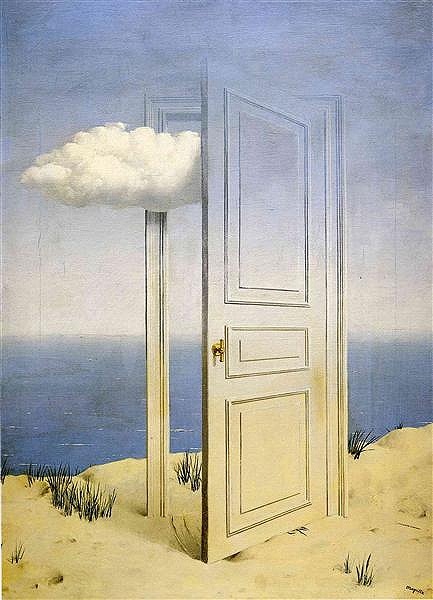
René Magritte: La Victoire (1939)
"I sign my name on the bottom of the ones I've finished just as if I was some famous artist or something …"
On my better days, I believe that everything in this world is here to serve as my teacher. On my best days, I actually catch myself practicing this foolishness. It's not mere foolishness, though, but one of those beliefs that to hold it makes it come true, which makes it a very special sort of belief, indeed. With a run-of-the-mill belief, both ideation and execution lie in the believer and perhaps a few fellow followers. It's a baby bubble operation that only works with considerable delusion. My belief about everything being my teacher requires no delusion and no more than a mustard seed of faith because it's really more about my acceptance of my role as student than about any teacher or lesson plan. One never knows what might become the subject of the next lesson or what might appear in the role of teacher, but only the willing student gains the benefit.
I am not universally recognized as a willing student.
Rhythming
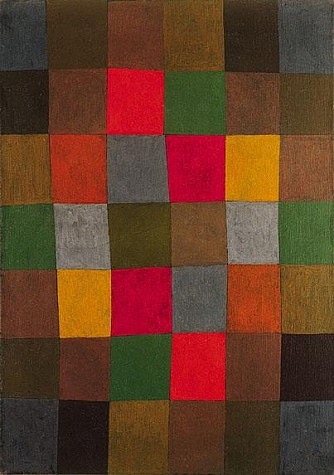
Paul Klee: New Harmony (1936)
" … just as if I might one day somehow qualify to be a professional myself."
The first week or so, I just sort of followed Curt The Painter around. I'd assigned myself as his dog'sbody, available to stoop, carry, fetch, and clean up. Since I was also The Client, this self assignment might have made things feel awkward, but Curt and I are old friends and I made my role explicit. I directed some work, like removing windows, while also assuming responsibility for some work, like refinishing windows, doors, and baseboards. By the start of the second week of work, though, my role had matured into a growing independence. I had my pop-up paint shop out in the driveway and Curt had the entry, stairway, and upstairs hall to prep. He didn't need very much help from me and I became distracted feeling my way into fulfilling my responsibilities. Curt was directing me, at my continuing insistence, for I wanted my contributions to pass muster, as if a real professional had completed them, so I sought continuing direction. I didn't always understand. I'd finished the final coat on the baseboards yesterday when Curt noted that we'd had a slight miscommunication. I'll be sanding some of the final coat off those boards today to properly reapply that last coat. I'm still Rhythming.
Rhythming provides cadence until the real backbeat kicks in.
BeatenPaths
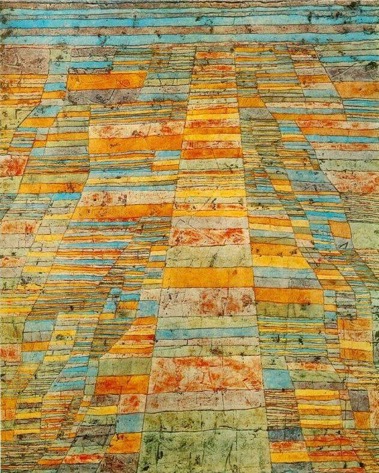
Paul Klee: Highway and byways (1929)
" … as if to try to compensate for what was sacrificed to become somebody else."
Four months after arriving back in the old hometown, The Muse and I conclude that there is no decent pizza to be had here. We add this to a growing list of unavailables and proceed. She compensated for the lack of pizza by making her own Pizza Bianca which easily bested anything we've ever gotten from any takeout and rivaled even New York City street pizza for texture.
One aspect of modern life baffles me.
Quittering
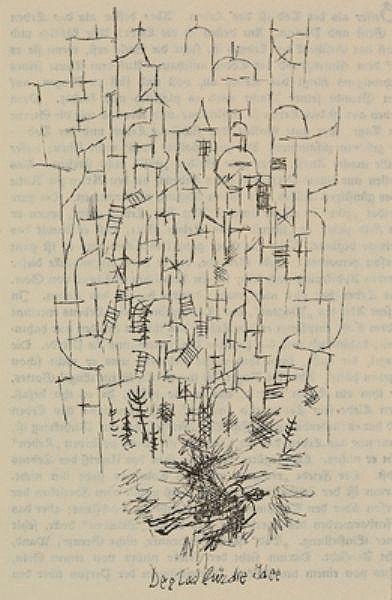
Paul Klee: Death for the Idea [Original Title: Der Tod für die Idee] (1915)
"The exit routes me through negative space toward an apparent vacuum."
Just over a month ago from now, as I was nearing the end of my SettlingInto Stories, I posted a story about being a quitter. In that story, I had started quitting the inconvenient habit of ingesting nicotine, a hyperactive nerve agent and mild sedative. I was doing battle by means of a counterbalancing hyperactive nerve agent, a psychoactive drug, apparently designed to make me temporarily crazy. The drug was working better than the quitting, though I had as the more dedicated addicts always say, "Virtually" quit. First by no longer carrying, then by no longer purchasing, while continuing crawling further and further out onto an ever-narrowing limb. I had not envisioned that limb's limits. Some days it seemed like I was crawling toward oblivion, which, I understand, amounts to a perfectly respectable and even an expected reaction when quitting. But quitting connotes a definite direction, like building up or winding down, not what now seems like perpetual around and around and around. I don't yet see an end in sight, when the recent hostilities might reasonably conclude and I get to go on enjoying what's left of my life.
The difficulty with doing without might be that it amounts to negative doing. It creates a vacuum.
Middling

Paul Klee: Twittering Machine [Original Title: Die Zwitscher-Maschine] (1922)
" … it's all about minding chickens."
There seem to be rather well-developed rules for starting and finishing things, but less distinct directions for what to do when in the middle of something. Perhaps those who create instructions consider middles more or less steady states requiring no description. I woke this morning to find myself in the middle of summer and felt myself startle at the recognition. Beyond the aspirations of spring and the easy appreciations of early summer, days have slipped into a routine, as if they were never different. The brown spots in the yard have definitively proven themselves incapable of greening, so I've stopped aspiring for them to green up. They'll rejoin the living after autumn returns. The garden's no longer becoming, but full-blown become now. It needs little tending and even less nurturing. The Muse reports an outbreak of squash beetles requiring complicated intervention involving diatomaceous earth and soapy dishwater. I'll let her handle that one. I'm busy Middling. Watering's found its schedule and hardly seems disruptive anymore. Days dawn and set with little variation. It's that part of the year when the melody suspends and the rhythm section tends to maintain the cadence; nothing's beginning and nothing's finishing, either.
I find myself in the middle of more than this season.
Fridaying

Paul Klee: Senecio [The Portrait of a Man Going Senile] (1922)
"I close one book so that I might open another."
I end my work week on Thursday. I work from Friday to Thursday with no days off. I take no days off because my work is my life and nobody takes days off from living until they take all subsequent days off, and I'm unprepared to do that yet, much less on a regular basis. Friday mornings bring a special responsibility. That's when I collate the passing week's production, reread every piece, and create a summary of where I've been. I post this summary along with a fresh piece, next week's first product. I work exclusively in circles.
Even on Fridays, I wake with little idea about what I might write.
Knowletch

Artemisia Gentileschi: Samson and Delilah, c. 1630–1638
"Experience doesn't come from cramming for the exam …"
Our painter Curt mixed the primer, thinning it as well as adding something to improve its viscosity to make brush marks less likely. I had prepped the entry hall baseboards, completely removing the rubber-based paint and sanding them smooth. I knew how to prep and paint, but under Curt's tutelage, I felt like an amateur. I asked if one of my old reliable brushes would work and he frowned before trundling out to his truck to fetch a more proper one. He did everything but tie my shoes for me as he handed me my paint bucket and a handful of rags. In any other context, I would have just painted those boards without thinking very much about technique or even outcome. I mean, I was just painting, no big anything for anyone. I knew how to paint. Or did I? Curt's fifty years of professional painting far surpassed my amateur experience. He even understood the underlying science behind every step in the prepping and repainting process. It wasn't just a hobby for him, as it had always been for me. I realized that my innocent ignorance far exceeded my knowledge about this subject, and so I quietly acquiesced to Curt's superior understanding.
I hesitated before applying that first brush stroke.
Solituding
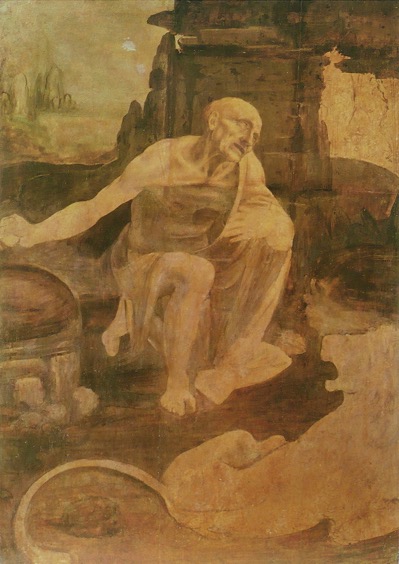
Leonardo da Vinci: Saint Jerome in the Wilderness (c. 1480–1490) Unfinished
"We leave slug trails of surreptitious accomplishments behind us …"
Most HomeMaking happens alone, not precisely in isolation, but certainly in solitude. Attempts to soften the resulting loneliness mostly fail. The Mower's too loud to allow listening to the ball game. So's the sander. Painting might prove too exacting to be done while in any way distracted. My ear buds sit largely unused in the bottom of the right front pocket of my Handyman Dave jeans. Most of my chores seem best done alone. Barn raising's a once in a lifetime situation. Few tasks need cooperation and many seem so mindless that they might threaten sanity if over-engaged in. One must ration efforts lest they steal a dimension from you. Long days doing the same damned thing does not produce anything very interesting to talk about over supper. What's new? Nothing.
All that said, I find HomeMaking's necessary Solituding reassuring.
Destructing
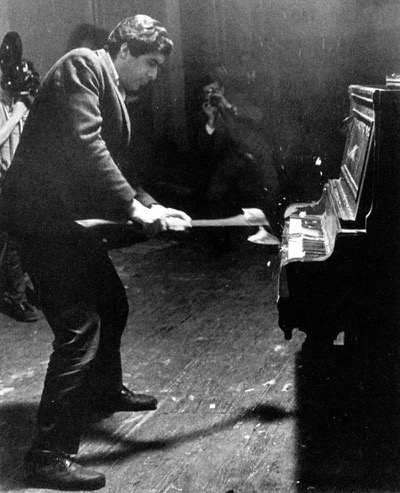
Raphael Montañez Ortiz: 'De-Struction Ritual, Henny-Penny-Piano-Sacrifice-Concert', 1967, performance
" … a true craftsman, self-improving my self-destructing, almost machine, marvelously more human."
I never feel closer to The Villa Vatta Schmaltz then I do when I'm Destructing something here. Our painter Curt and I pulled out a couple of double hung windows and I felt like I really owned this place. Removing doors empowers me, but cutting away wall-to-wall carpeting and pulling up the underlying tack strip, that work liberated me. There will be no reinstalling that carpeting I cut, no attempt to put any Humpty Dumpty back together again. I could have and might have just uninstalled that carpet except I wanted to keep a soft-padded walkway during as long of the repainting effort as possible, so I just cut back a few inches of the edges, enough to gain access for prepping and painting trim. The flooring contractor has not yet been by to advise, anyway, so I hold my ultimate Destructing skills at bay for now. For now, but not forever. I so carefully preserve so much here, but given half a chance to utterly destroy something, I feel even more the successful steward. Maybe homes, like fruit trees, need steady pruning, removing some portion of whatever's accumulating on some regular basis. Scorch a corner of this earth and it seems to become more alive, to thrive, an apparent paradox of HomeMaking.
Weeding the garden carries a similar remit.
ReImprinting

The Planet Mercury as a Doctor on Horseback,
Miscellany: Anatomical-Physiological Description of Men;
Liber Synonimorum; Descriptions of Planets, Zodiac, and Comets;
Treatises on Divination from Names, etc., German (shortly after 1464, Ms. Ludwig XII 8)
" … apparently finished ReImprinting upon our new home."
Portland's not my town anymore. Oh, I still know my way around the East side, but now only as a vaguely interested visitor rather than as a resident booster. I began as a booster. I found it quaint, more accessible than Seattle had been, more a large rather than a full-blown BIG city. I limited my experience of it to immediate necessity, only very rarely leaving the downtown and Central East Side, bounded by Lloyd Center and Sellwood, the West Hills and Mt. Tabor. Most of the West side of the place never existed for me and I scrupulously avoided it as confusing. I worked downtown. I lived just across the river. I never in nearly thirty years there, ever commuted by car. I proudly rode the bus. I treasured the libraries and the bookstores. I casually shopped the big downtown department stores as if they were mine. I had come from a much smaller city, but I'd ReImprinted upon that larger one. I'd retreat back to my hometown some weekends, but without seriously considering moving back there where opportunity seemed to have passed it by. Maybe a great place to retire or to have come from, but no place for a career.
Sunday afternoons, I'd head back to West of the Mountains without very often checking my rear view mirror.
HisStory

Columnar-blocky jointing basalt, Frenchman Coulee, west-central Columbia Plateau, Washington (photograph by Terry Tolan)
" … homesteading beneath this grass."
The morning reached out and enveloped me. We were toodling, our first real diversion from our regular routes since returning from our exile. We could conspire to tend ancestor graves, a chore that went begging during our absence. One corner of my mother's family arrived late to claim their section under The Homestead Act. Their piece of Oregon was not located anywhere near the Eden portion of the end of the Oregon Trail, but short of The Cascade range in rimrock country. Even today, that country is more sparsely populated than it was before the European settlers like my ancestors came. They came to claim their part of the American Dream, which must have seemed more like a nightmare to them at times. Evan and his lovely wife Sarah (nee Jackson) Wallace, who was the spitting image of my mother in her later decades, came west not by wagon train but by the Northern Pacific and stagecoach. They waited out their homesteading claim working for a family who'd already improved theirs, living in a tent on the property through their first Western winter. They lost two sons to diphtheria, leaving my great grandfather as their oldest heir.
We drove what must have been the trail Evan and Sarah took up to finally perfect their claim.
Ordersing
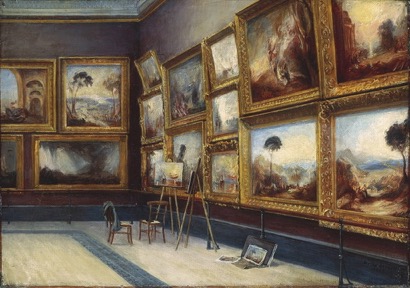
Bertha Mary Garnett: A Corner of The Turner Room in the National Gallery (1883)
"I'm learning to consider in what order of work I am engaging."
Change comes in several guises or 'orders,' typically referred to as first through fourth order change. First Order Change involves little more than planning and execution. Second Order does First Order one better by considering, for instance, how one might improve the means of planning or executing. Third Order Change might consider the problem as the solution to the difficulty, like when after failing to counsel a teenager, the parent concedes and 'lets them have their way,' figuring they might better learn through headstrong doing than by even emphatic supervision. Fourth Order Change might revise the rules under which change gets attempted. Running around with scissors might come to be recognized as a perfectly normal activity for some, rather than a certain pathology needing definite fixing. It matters how one perceives their problem space. First Order Change strategies have little effect in situations where fundamental assumptions underly an undesirable situation. Installing new linoleum cannot resolve most marriage difficulties, regardless of what the Sunday Supplement advertisement might claim.
I mention this Ordersing here because a similar framework probably influences HomeMaking, too.
UnSeeing
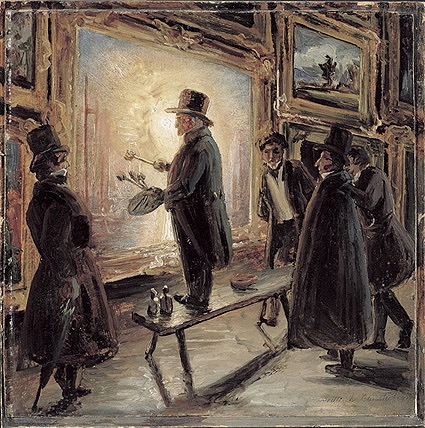
Thomas Fearnley: (Joseph Mallord William) Turner Varnishing [Norweigan-Turner Fernisserer] (1837)
" … the impression might seem have been rendered by a three year old with a broken crayon."
As our painter Curt and I disassembled The Villa's entry hall for repainting, I began noticing features I swear I'd never before seen. Curt found a hook screwed into a ceiling corner I'd walked under at least ten thousand times without once noticing its presence. I might have just been seeing that same old space in a new light because we had taken down that horrid chandelier The Muse had always loved to hate. I puzzled over how the ceiling interfaced with the second floor and which spaces were foreground and which trim, a question that had never occurred to me to ask until then, poised like Christopher Robin sitting not quite half way up or down the stairway. The thing about seeing, I started thinking, seems to be that it involves an awful lot of projecting. Initially, perhaps, I might quickly see before categorizing and classifying whatever appears before me, in this instance, "Stairs." I then start UnSeeing details as they become unseen again, framed but essentially invisible. This facility generally works just fine for me. It allows me to wander all around The Villa in predawn darkness without needing to turn on any lights. It also seems to inhibit my ability to foresee, though, to envision future difference, for how can I expect to repaint surfaces I cannot actually see? Repainting seems to insist upon a fairly tight interface with whatever's really before me. My shorthand classifying manner of seeing serves me poorly then, for it seems to actually be a dandy way of UnSeeing.
The thing about drawing, insisted Betty Edwards, author of the fantastic Drawing On The Right Side Of The Brain (Tarcher, 1979) and host of the DrawRight website exploring its insights, it depends upon seeing.
MythedInformation

Rembrandt: Judas Returning the Thirty Silver Pieces (1629)
"Those who seem most righteous might just be those most infected."
As we today begin prepping interior walls for painting, I remember a time nine years ago when, filled with MythedInformation, I set about stripping and repainting The Villa's exterior. I'd given myself a month and figured that I'd probably work alone. I had researched, or searched, what I might need to succeed, but I'd consulted with no expert in the field. I'd found and tried to purchase a used Silent Paint Remover®, a six hundred dollar implement which was reputed to ease paint removal. When I arrived at the seller's place, a lovely Northern Maryland horse farm worthy of Kentucky Bluegrass Country, the seller reported that she could not get the thing to work and decided to just give me the damned thing. She could not bear to sell something that wasn't operating. Later, my step-son and son-in-law repaired the electrical switch with an eighty-nine cent replacement bought at the local Ranch Supply. The paint remover worked better with two involved and my brother generously volunteered to help. Then his wife appeared along with his step-son, and a friend drove down from Spokane to help construct scaffolding around the gazebo. My mythical, independent, one-man project became a memorable communal effort. No man ever was an island, and not even a half-decent isthmus.
I'd also gotten the notion that the siding needed remoisturizing.
ADoorInc
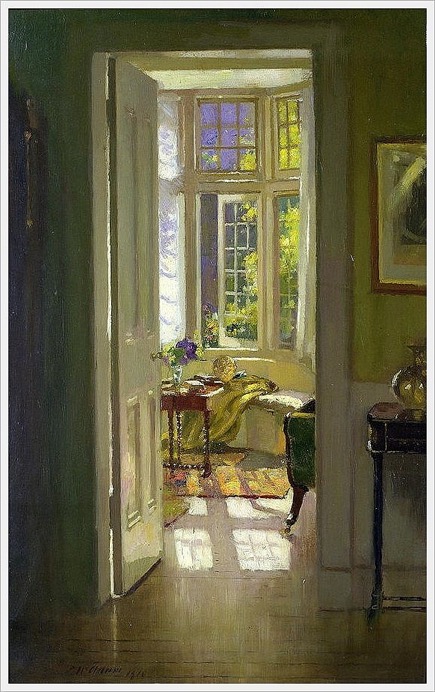
Patrick William Adam: Interior Morning (1918)
"I intend to paint in humble adoration, invisible masterpieces for the ages."
Like any old place, The Villa Vatta Schmaltz has a lot of doors, twenty, depending upon how I count them. A few must be original to the place for they're exercises in mortise and tenon joining, their heritage obvious by looking at their edges. Most seem of more modern heritage, but still solid five-panel doors, none of those hollow core abominations. Two appear irreparable. The rest need differing degrees of restoration ranging from simple painting to full strip, sand, prime, and finish. All need hardware stripped and probably replaced with brass. The painter visited yesterday and we roughly laid out the work before us. He approved our color palette and I took responsibility for the doors and two of the windows. I removed the first door last night, signaling the start of a significant side chapter in our overall restoration effort. I cleaned out the garage to make way for my door factory wherein I will refinish a dozen doors over the upcoming weeks. I'll erect a pop-up tent over a tarp, move in my saw horses and a work table, then tuck down my head and start refinishing. I'm calling this operation ADoorInc, though it's incorporated in spirit only and strictly not for profit, quite the opposite. It will certainly serve as a significant expense in terms of both money and aggravation, but I loves me doors. I imagine that I'm not merely refinishing them, but adoring them: ADoorInc. Get it?
I suspect that by the time I'm halfway through this pile of doors, I might no longer or ever again adore doors.
Sorting

Henri Rousseau, “Tropical Forest with Monkeys” (1910)
"Organization achieved by endless sorting seems the very soul of HomeMaking."
HomeMaking seems about 90% Sorting. I'm forever shuffling something from here over to there then back again. I might explain painting as a Sorting of sorts, whereby I sort a can's contents. I could go on with analogies, but you've probably already gotten my point. HomeMaking is Sorting most all of the way down, like Ghandi's elephants and Prachett's tortoise. Moving In Day, the movers seemed incapable of following The Muse and my conflicting directions, resulting in stuff smeared all over Christmas and back. We're still Sorting the result. I yesterday sorted out the garage, a chore I accomplished by first sorting out the spaces behind the garage. There, a few hundred assorted bricks, pavers, and concrete blocks needed relocating out of my Cadillac Composter to somewhere else, hopefully a place where they would not be constantly in the way, or underfoot, as they say. I decided to hide most of the bricks beside the garage, a space that has needed Sorting for ages, the place where I store my ladders. I pulled everything out of that creepy space, spiders, possum poop, and all, and swept off the resulting mess before tidily stacking everything off to the side. Then I had to sweep up the mess, which included broken fluorescent light tubes someone had tossed in there. Then I began ferrying bricks with my Muck Bucket Cart, about twenty a load. I laid the bricks, five or six across, to roughly pave that space, sorting bricks by size, color, and condition. My judgement was fine-tuning as I sorted, noticing variation where formerly none had existed. By the time I'd finished, several hours later, I had gained a deep sensitivity to the subtler features of bricks. No longer merely leftovers, I'd taken full possession of them by then. They were mine!
My neighbor Larry peeked in to comment on the proceedings, but I didn't really hear what Larry said because I had fallen into a first class Sorting trance.
TheHandyman'sDilemma
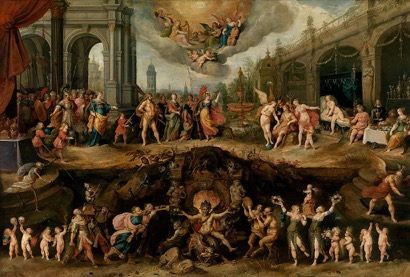
Frans Francken the Younger: Mankind's Eternal Dilemma – The Choice Between Virtue and Vice (1633)
"TheHandyman'sDilemma seems, in this light, utterly normal."
As a HomeMaker, I fancy myself a Handyman. I ironically refer to myself as HandyMan Dave because I'm neither a handyman nor a Dave, Dave being what people call me who attempt to affect that they know me well, but don't. I am exclusively David to myself and to my intimates, and nobody's handyman, not really. I recognize the paradox within which this title places me. This label both materially misrepresents me and my capabilities, yet I still don what I just as ironically refer to as my HandyMan Dave uniform—worn, paint-stained jeans now open at one knee and a shirt featuring smears of every color of paint I've handled while wearing it over the past decade. I crown this suit with my trusty Muse-made havelock which is equally as stained as my shirt. When so garbed, I experience a fundamental mindset shift. No longer the philosopher, I become a simple laborer. I cease fretting over making meaning of my actions, and dedicate myself to acting, and most often to acting rather mindlessly. I pride myself on my discipline then. I put my head down and simply engage. I feel most like some sort of monk then, not precisely Zen-like, but similar except absent evident wisdom.
I maintain a cast of characters within me.
KittenMaking

Albrecht Dürer: Sleeping Lioness. (circa 1520s)
Notes: Owned by the Print room of the Warsaw University Library.
Burned deliberately by the Germans in October 1944 during the Planned destruction of Warsaw.
"The smallest things seem to matter most."
The Muse and I identify as confirmed cat people and have been since before we were married, when we were still living in that apartment complex overlooking the Willamette River south of Portland, where a ginger cat with a crumpled ear adopted us. I christened him Crash and he moved right in, in clear consensual violation of our renter's agreement's prohibition against pets. Crash didn't need us to domesticate him. He domesticated us, but I suspect his primary purpose was to encourage us to provide a safe place for him to become a kitten again. As a feral or abandoned or whatever he had been before he found us, he'd had to maintain a certain street toughness. He'd had to nurture his inner lion to live. With a home, he could let down his guard, sit in a lap, and become a kitten. I think of home in the same way now. If families exist to make people, homes exist to make kittens.
I keep telling Molly, our formerly feral female, that I'm turning her into a kitten.
Sidling
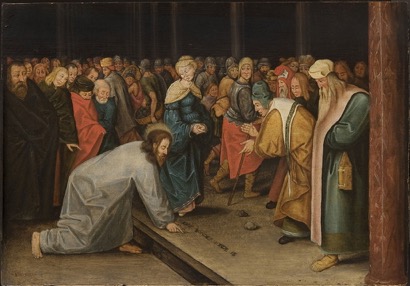
Pieter Breughel the Younger: Christ and the Woman Taken in Adultery (circa 1600)
When he meets the Adulteress, Jesus writes: "He that is without sin".
Based on a painting by Pieter Bruegel the Elder, in the Courtauld Institute Galleries, London (The Princes Gate Collection, 9), 1565, grisaille
"HomeMaking's not a solo occupation …"
I recognize myself as indecisive. I only very rarely directly confront any challenge, but choose, either by habit or nature, to obliquely approach sideways. This tactic doubtless leaves me looking indecisive, but I sense that I'm more deciding than choosing not to decide. I take my time. I'll take your time, too, without first asking. I seem to need some space to make up my disordered mind. I consider from several angles. I play likely scenarios. Exhausting those, I run through a few of the more prominent unlikely ones before finally engaging. I tell myself that I am not procrastinating, though any observer might feel fully justified in questioning my assertion. I take almost forever to get started, but once started, I tend to be all in until I'm finished. I do not give up my heart on whims. Once I agree, once I engage, I'm dependable and make my commitment. I just do not commit lightly.
I consequently shove a considerable bow wave before me.
AnOtherSummer

Maxfield Parrish: Study for Janion's Maple (Under Summer Skies) (circa 1956)
"Part of what we visited no longer existed but we could still see it and share it …"
By the second week of July, it's finally sinking in that it's summer again. Another Summer. AnOtherSummer this time. I was impressed into service as daycare for The GrandOther this week, a role I had been secretly hoping I'd be drafted into. I'm not the greatest grandfather ever devised, but I'm also not the worst. At first, I thought of myself as more of an uncle than a gramps, but that was fifteen years and more ago when TheGrandOtter spent summers with The Muse and I. The Otter's grown and gone now and only her little sister stands between her dad and step-mom becoming empty nesters themselves, like The Muse and I once were when we pressed for annual summer GrandOtter visits. Now it's TheGrandOther's turn to receive the treatment.
The treatment. I speak of it as if it is a thing when its' not.
BeingPrepared

J. C. Leyendecker: A boy holding a sword labeled "Be Prepared." Another person wearing a flag holds a shield behind the boy. The poster advertises USA Bonds and the Third Liberty Loan Campaign by the Boy Scouts of America. Liberty Loans and Liberty Bonds were used by the US Government to fund World War I. (1917)
" … they found that there was probably no adequate replacement for a sincere lack of preparation."
Despite a century of exhorting people to Be Prepared, The Boy Scouts, whether or not they survive as an organization, will be remembered as having been wholly unprepared to face the scandal that laid them low. They might have just as usefully insisted that people should Be Prepared To Feel Unprepared, since BeingPrepared most often amounts to simply acknowledging that one can never be adequately prepared. Build that Maginot Line only to later find that it defended against a past threat rather than a present one. The careful, almost ruinous preparations became more encumbrance than asset in the moment that mattered. I won't argue against preparation, just against over-relying upon preparation as an iron-clad defense, especially when iron cladding limits mobility to respond to the unanticipated. The German's Zeigfried Line defended no better than the Maginot did for the French. The ruins of both still stand as silent testaments to the paradox not even The Boy Scouts could avoid. Preparation might well prove necessary but only rarely sufficient. Some undeterminable portion of defensive energy might be better focused upon mobility in some utterly unforeseeable future moment.
Our best laid plans have been starting to show their vulnerabilities.
FatEhGue
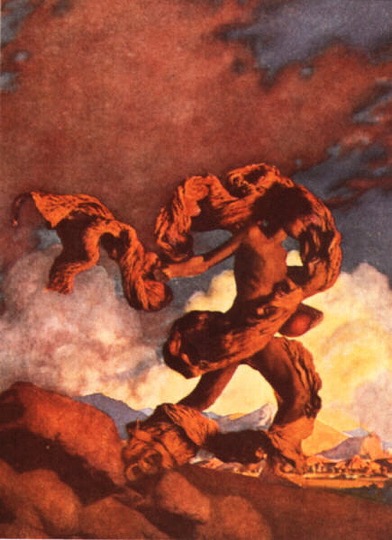
Maxfield Parrish: Cadmus Sowing the Dragon's Teeth (1908), created for Collier's
" … she asks me how it was out there. Miserable, I declare …"
I read a lot of comic books in my youth. My paper route left me rather affluent for a ten year old, so I could afford a few Baby Huey or Sad Sack comics, not to mention most every edition of MAD Magazine during its heydays. When I ran into a word I didn't know, I usually made up both a pronunciation as well as a meaning, and just continued reading as if I'd understood. Some words defy any eye's naive interpretation, the term for San Sack's uniform prominent among them for me. He wore fatigues, or FatEhGues, as I sub-vocally pronounced them to myself. I was uncertain what the term referred to. Perhaps Sad Sack's attitude, which he wore more prominently than he wore his uniform. It didn't matter. I always figured that whatever peg-legged interpretation I made when reading sufficed and might even prove superior to disrupting my reading flow to reference the real pronunciation and meaning. I still hesitate when I encounter that word, though, reverting to my first parsing before snapping back into my more mature understanding.
I've been noticing just how exhausting living beneath our current heat dome has become.
Fourth
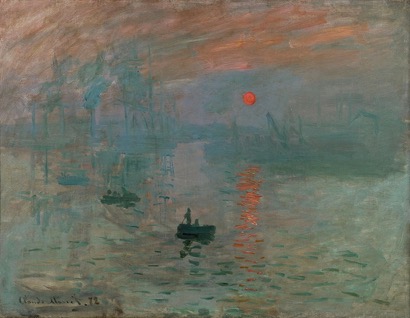
Claude Monet: Impression, soleil levant (1872)
" … a nation ruled by laws we steadfastly refuse to obey on the Fourth of July."
I baffled myself imagining how I might explain July the Fourth to anyone not native to the United States of America. I cannot quite explain it to myself. It tends to contain more mixed metaphors and mixed up factoids than all other holidays combined, yet it does not really count as in any way holy. It stands as our annual contradiction, a serial misrepresentation of our own history, familiar yet fuzzy, clear but curiously alien. Stand downwind of the business end of the typical July Fourth celebration and one might find themselves mistaken that we were celebrating some battle or something, so thick seems the smoke and smell of ozone and gunpowder, but history records no great victory or defeat on this date, just the founding of our country, which came as more of a whimper than an explosion. I might be committing the equivalent of Critical Race Theory here because I'm poking at the myth, looking for substance, a well-recognized crime against common decency.
I'll make no excuses. I've never liked how we celebrate our founding.
BigNSmall

A Mughal Miniature, Composition by Basawan, painting by Chitra for the left side of the illustration.Right side composition by Basawan, painting by Chetar:
Akbar riding the elephant Hawa'I pursuing another elephant (Ran Bagha) across a collapsing bridge of boats, 1561
from the Akbarnama. (circa 1590 -95)
" … that's how this world was supposed to work."
As empty nesters, The Muse and I mostly inhabit a world scaled for people who stand between five and six feet tall. At this scale, door handles seem perfectly positioned, toilets properly elevated, and mirrors more or less appropriately positioned. A city block's no kind of a walk, and a dozen easily bend to our will if we want. Either of two cars remain an option if we're in a hurry, even a bike. We live in a world scaled for us, a remarkable privilege, though we each remember when our world was not thus, back when it seemed to have been scaled for people much larger than us, a world which sometimes seemed hostile to our very presence. We persevered, matured, and more or less outgrew that humbling beginning.
I revel in nothing more than I revel in the presence of small people, adults still in waiting, the following generation, up and still coming.
MidSummerEvening

N. C. Wyeth: Jim, Long John Silver and his Parrot from the 1911 edition of Treasure Island
"The young ones now face even greater challenges …"
Poets and entranced travel writers have had their way with the MidSummerEvening until anyone might be easily excused for expecting them to seem romantic. I blame too many stars in way too many eyes and a gullible public, and also a distinct shortage of children in recent generations. Though I know I might well sound like the geezer I am when I insist that MidSummerEvenings remain the exclusive domain of kids, I will insist away anyway. Grown-ups, or purported ones, might find reason to sip some beer and shoot off a few illegal fireworks to celebrate a freedom they've unaccountably lost all track of, but kids, especially those not yet outgrown their age in favor of nihilistic pursuits like zombie movies and TicToc threads, own this space and always have. After supper's dispatched, which was a brief distraction at best, the kids take to the yard again as shadows start creeping in. It's still uncommonly though seasonably warm, and anything can happen within a kid enjoying the high that comes from a little too much hot dog chased with ice cream smothered in strawberries. They turn into pirates then and rampage through the long twilight hours. The best any grown-up can do is watch in wonder while perhaps helping to set up the tent in the backyard for the later sleep out.
It helps if the house has a circular yard, one which allows for unimpeded circumnavigation around the house, for as my wise niece noted, when (not if) that hose manages to soak you, running two or three trips around the world, and you're almost completely dried off.
Cut

Giovanni Francesco Romanelli: LivioAndronico [Ceiling in the Louvre Palace] (circa 1650)
"Our home's no masterpiece to anyone but us …"
When The Muse asked if I'd like her to paint the Cut in the basement stairwell, I gratefully accepted her offer. I'd been dreading that part of the job, since I'm basically a slob when painting and I usually only manage to create fine lines by using tape. I had not wanted to tape the freshly painted ceiling. I couldn't quite reach every inch of of the line and my ladder, which I could not open all the way on the narrow landing, left me feeling like I was balancing on the head of an unstable pin. She gamely scurried off to change her clothes, grateful for some activity not involving Zoom®.
A Cut line separating wall from ceiling seems the most bedeviling element of painting.
Permanence

Henri Matisse: Self-Portrait (1937)
"Drawing is like making an expressive gesture with the advantage of permanence." Henri Matisse
"I paint over inevitables."
I speak of Permanence without apparent irony, though I might be one of the most temporary entities around. My mailbox could outlive me, yet I undertake what I must clearly mistake to be permanent changes as part of my HomeMaking efforts. I contribute much impermanence, too. My lawn mowing undoes itself over the course of a week. Weeding might sustain for a month or longer. Watering, depending, might last for a day or two, seemingly always needing redoing. I rarely build anything permanent. I don't personally pour concrete, though I have directed others to do that to benefit this home, HomeMaking by replacing crumbling original replacements, which were intended as permanent replacements of the original pavement, which is long gone now. The house, subjected to one hundred and fourteen years of successive HomeMaking has proven more permanent than most of its parts. Inside, I doubt that the original owners and builders would today recognize what they'd wrought. The current front porch appears to have been built atop the original. Not even the original paint remains on the outside shell since I stripped it to bare wood, that and a few original windows.
Painting's about as Permanent as I get.
Turnings
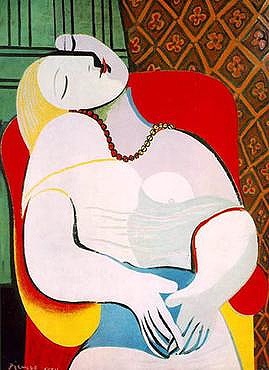
Pablo Picasso: Le Rêve (1932)
"It's never too late yet."
Neither a straight nor particularly narrow road, HomeMaking follows a meandering path. The past quickly fades after another seemingly inevitable turn and the way ahead remains largely obscured until just before the next future emerges. It's continuing surprise and anyone wandering there might easily lose heart, given the continuing lack of positive reinforcement. The sweetness in HomeMaking seems retroactive, occurring well after the bulk of the effort's concluded. For the duration of the excursion, aspirations fuel the engagement. Visions of imagined futures motivate continuing. It seems at root, faith-based by nature. Human nature might well prefer more tangible encouragements which remain only sporadically present. Discouragement seems most likely and might well prove deadly. Many abandon their dreams along the way. It seems extraordinary when anyone ultimately finds their way home, either again or originally. But then there are these turnings. Always the Turnings
I spent the first few days of this latest HomeMaking excursion in extremis.


